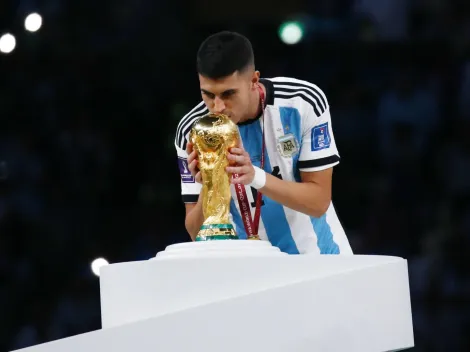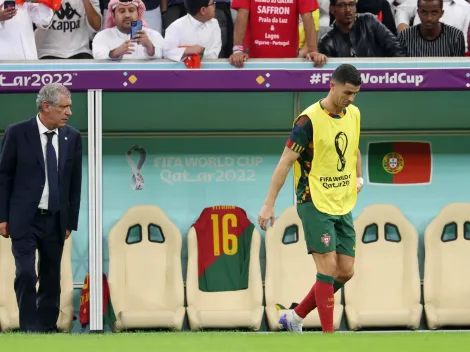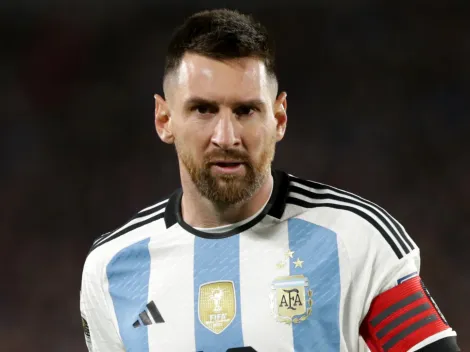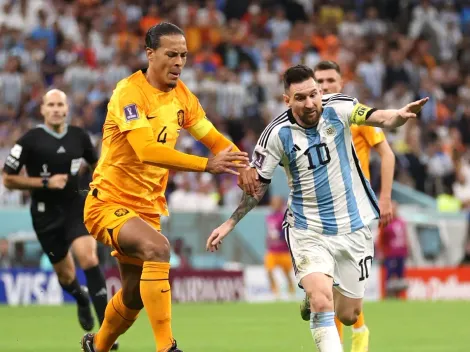Several steps above the rest, the FIFA World Cup is the most prestigious tournament in the world of soccer. Desired by all, played by some, won by only a few. The curious thing is that there does seem to be a very simple formula to follow to win it. Will it work in Qatar 2022?
This tournament boasts 92 years of history. Throughout these years, 21 editions have been held and one more is on the horizon, very soon. Of 211 national teams affiliated to FIFA, only 83, including the host Qatar 2022, which will play the tournament for the first time, have been able to participate in it. There is no doubt that the Qualifiers are a demanding filter.
The surprising thing is that in 21 editions there have only been 8 winners. Eight world champions who have shared all the soccer glory and have followed the same path to success, which has a close relationship with their coach and nationality. Let’s see if the trend continues in Qatar 2022.
The trend in FIFA World Cup winning teams
Evidently, there have only been 8 managers capable of leading their teams to lift the FIFA World Cup trophy. The curiosity that arises is that each National Team that was champion of this tournament was led by a coach of the same nationality. After 21 editions in which this has been repeated, it cannot be a coincidence.
Following a simple mathematical logic, Brazilian coaches have won the FIFA World Cup the most, with 5 championships, followed by 4 Germans, 4 Italians, 2 Uruguayans, 2 Argentinians, 2 French, 1 English and 1 Spanish. So those competing in Qatar 2022 already have an early parameter of what the statistics predict according to the nationality of their coach.

Jules Rimet, FIFA World Cup Trophy. (Keystone/Getty Images)
FIFA World Cup-winning coaches
If having the honor of winning the World Cupas a player or as a coach is already something complicated to achieve, having been able to do it in both roles is even more so. Of the 20 champion coaches, only three have also won as players, and those are Brazil’s Mario Zagallo, Germany’s Franz Beckenbauer and France’s Didier Deschamps, who will seek a second championship with France in Qatar 2022.
Within the FIFA World Cup honor roll for managers, there is a very special place for the Italian Vittorio Pozzo, as he is the only one who has been able to win this tournament twice, and, moreover, consecutively. There are only six coaches who have been crowned at home: Alberto Suppici (1930), Vittorio Pozzo (1934), Alf Ramsey (1966), Helmut Schon (1974), Cesar Menotti (1978), and Aime Jaquet (1998).

FIFA World Cup Trophy.(Stuart Franklin/Getty Images)
Alberto Supucci – Uruguay – Uruguay 1930
Supucci not only became the first coach to win the FIFA World Cup, but also holds the record as the youngest coach in history, as he was only 31 years old when Uruguay beat Argentina to be crowned champions.

The Uruguayan Team, champion of the FIFA World Cup. (Getty Images)
Vittorio Pozzo – Italy – Italy 1934, France 1938
There is little left to add about Pozzo after noting that he is the first and only coach in history to win the FIFA World Cup twice in a row. He also holds the record of being the longest serving National Team manager on the European continent with 19 years (1929-1948).

Vittorio Pozzo and the Italian squad in the 1934 World Cup. (Keystone/Hulton Archive/Getty Images)
Juan Lopez Fontana – Uruguay – Brazil 1950
The master hand that led Uruguay to the Maracanazo of Brazil 1950. Lopez Fontana has a peculiar history, as he did not have a career as a professional soccer player prior to his coaching stint. He learned his trade from another Uruguayan world champion coach, Alberto Supicci, as he was a medical assistant in one of the teams Supicci coached.

Alcides Ghiggia, key player of the Uruguayan squad that won the 1950 World Cup. (Getty Images)
Sepp Herberger – Germany -Switzerland 1954
He had three stints as coach of the Germany National Team, and it was in the last one that he achieved the greatest honor of his career, and perhaps of his life, being the first coach to lead the Mannschaft to win a FIFA World Cup.

Sepp Herberger, German coach. (Keystone/Getty Images)
Vicente Feola – Brasil – Sweden 1958
The Canarinha’s golden history at the FIFA World Cup began with Feola at the helm, who was not a soccer player before managing.He put his trust in a very young Edison Arantes do Nascimiento Pelé at the tender age of 17, and he did not disappoint, as he was the pillar that made him the first Brazilian manager to win the tournament.

Vicente Feola with Pele. (Evening Standard/Hulton Archive/Getty Images)
Aymore Moreira- Brasil – Chile 1962
He took the reins of Brazil in 1961 with the mission of maintaining the momentum that led them to their first world championship in 1958. After dealing with the loss of Pelé in the middle of the World Cup, Moreira managed to keep his team’s triumphant momentum and led them to become the second, and so far the last, two-time champion in the history of this tournament.

The match ball of the final game of the FIFA World Cup Chile 1962. (Mario Tama/Getty Images)
Alf Ramsey – England -England 1966
If there is one memory that England treasures with all its might it is that of when it was the first, and so far only, winner of the FIFA World Cup. In a home tournament that culminated in a refereeing controversy, Alf Ramsey ensured that his boys, led by Bobby Charlton, were crowned champions.

Alf Ramsey, English coach. (William Lovelace/Daily Express/Getty Images)
Mario Zagallo – Brazil – Mexico 1970
No one has won the World Cup more times than the Old Wolf. He was a two-time champion in 1958 and 1962 as a player; then, in 1970, he was the manager who led a dream team to the crown in Mexico. Finally, he served as assistant coach in the 1994 Brazilian championship and could have won it again as coach in 1998, but had to settle for a runner-up finish. Zagallo is a true legend of this tournament.

Mario Zagallo, Brazilian coach. (Mark Thompson /Allsport)
Helmut Schon – Germany – Germany 1974
Schon was the first to overcome a painful defeat in the final of a FIFA World Cup and then repay his debt by winning it. After controversially losing the 1966 final to hosts England, he led Germany to win their second World Cup, the first one they hosted. He is the managerwith the most World Cup games managed.

Helmut Schon, German coach. (Evening Standard/Getty Images)
Cesar Luis Menotti – Argentina – Argentina 1978
Argentina’s immense soccer tradition experienced its first moment of absolute glory when in 1978, with all its people behind it, it was crowned world champion for the first time. The mastermind who decided to go for Mario Kempes, and not to include a very young Diego Maradona in the team, was Cesar Luis Menotti.

Cesar Luis Menotti, Argentinean coach. (Duncan Raban/Allsport/Getty Images)
Enzo Bearzot – Italy – Spain 1982
Bearzot is a whole box of anecdotes. First of all, he is the manager with the most games managed with the Italian national team; then, his only title as a coach was precisely the FIFA World Cup won at Spain 1982, the third in the history of the Azzurra.

Enzo Bearzot, Italian coach.(Duncan Raban/Allsport/Getty Images)
Carlos Bilardo – Argentina – Mexico 1986
If Menotti turned his back on Maradona, Bilardo gave him the keys to the Argentine team in 1986 and Diego repaid him with the greatest honor of his career: the FIFA World Cup trophy. He came within a whisker of becoming a two-time champion of this tournament after losing the final of Italy 1990 in a rematch with Germany, whom he defeated in the final of the edition held four years earlier in Mexico.

Carlos Bilardo, Argentinean coach. (Organising Committee South Africa via Getty Images)
Franz Beckenbauer – Germany – Italy 1990
If Beckenbauer’s legend was already great, by leading Germany to win their third FIFA World Cup in 1990 he became immense. He was runner-up at that tournament in 1986. Of all those considered to be the greatest footballers of all time, he is the only one who managed to win this tournament as a coach, something that neither Pele, Maradona, Cruyff or Di Stefano did.

Franz Beckenbauer, German coach. (Torsten Leukert-Pool/Getty Images)
Carlos Parreira – Brazil – USA 1994
The latest example that it is not necessary to have been a soccer player to be a great coach. Parreira ended Brazil’s 24-year drought without winning a FIFA World Cup. He holds the record of being the coach with the most editions of this tournament with 6: two with Brazil, and 1 each with Kuwait, United Arab Emirates, Saudi Arabia and South Africa.

Carlos Parreira, Brazilean coach. (Dominic Barnardt/Getty Images)
Aimé Jacquet – France – France 1998
Alongside Michel Platini, Zinedine Zidane and Didier Deschamps, Aime Jacquet holds a special place in the memory of French soccer fans. He was the guide of an iconic team that gave Les Bleus their first FIFA World Cup, winning it in front of their fans in Saint Denis against Ronaldo Nazario’s Brazil.

Aime Jacquet, French coach. (Stu Forster/Allsport/Getty Images)
Luis Felipe Scolari – Brazil – Korea-Japan 2002
Felipao is the last coach to win the FIFA World Cup with Brazil. He is remembered for doing so with a style of play that is the opposite of the Jogo Bonito that usually characterizes the Canarinha, boosted by a Ronaldo Nazario who exacted revenge after failing to win the title at France 1998.

Luiz Felipe Scolari, Brazilean coach. (Jamie McDonald/Getty Images)
Marcello Lippi- Italy- Germany 2006
Italy is a silent predator. When you least expect it to attack, it does so mercilessly. And so, when nobody imagined it in Germany 2006, Lippi’s team went on to win the FIFA World Cup on penalties at the expense of Zinedine Zidane’s France.

Marcello Lippi, Italian coach. (Valerio Pennicino/Getty Images)
Vicente del Bosque- Spain- South Africa 2010
Possibly the last cult team in living memory at the National Teams level. Del Bosque took the foundations left by Luis Aragonés and led Spain to win their first FIFA World Cup with a style of play that won the hearts of all and sundry.

Vicente del Bosque, Spanish coach. (Martin Rose/Getty Images)
Joachim Low – Germany – Brazil 2014
In a clear nod to the style of play of Del Bosque’s Spain, Low’s Germany dominated the FIFA World Cup Brazil 2014 to win the title. On their way to success, they overwhelmed and humiliated the host country and Argentina with Lionel Messi at his best.

Joachim Low, German coach. (Alexander Hassenstein/Getty Images)
Didier Deschamps- France- Russia 2018
He was part of the squad that won the first World Cup for France in 1998. That spirit and winning mentality permeated him and led him to guide les Bleus to their second conquest, 20 years later, when, based on fast play and efficient defense, they won Russia 2018.

Didier Deschamps, French coach. (Matthias Hangst/Getty Images)




